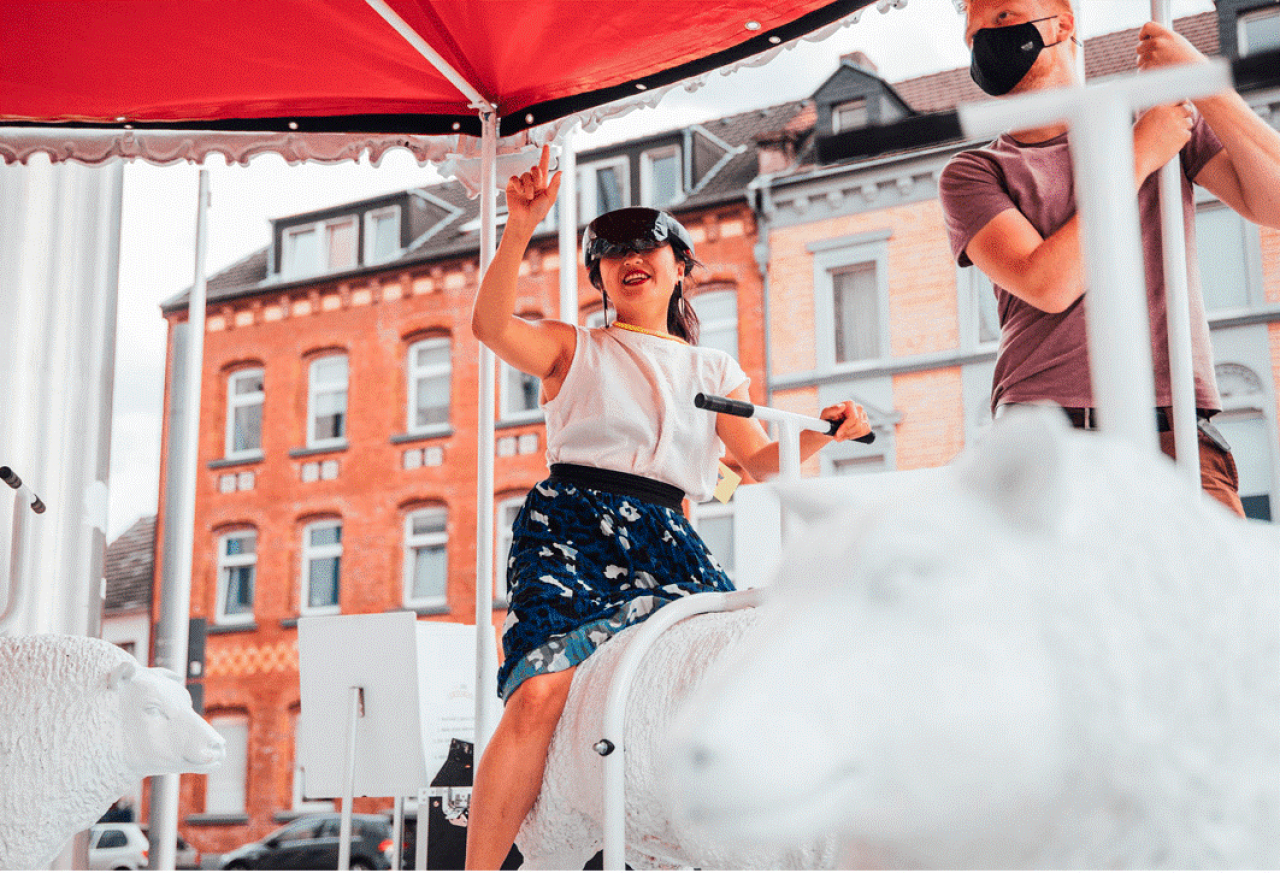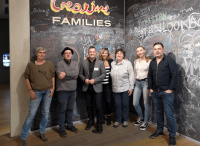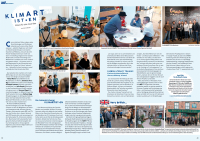
Building a creative alliance for climate action – adapting the Manchester model in the heart of the Ruhr
Gelsenkirchen’s Urbact Transfer Story
By Susanne Dippel, Climate Action Manager, City of Gelsenkirchen and Stefanie Rogg, freelance Project Manager for the City of Gelsenkirchen
Our “black gold“ is already a thing of the past. Today, vibrant neighbourhoods, locations of excellence for the arts and fascinating creative events are outstripping industrial culture. Programmes such as Kreativ Quartiere Ruhr have shown how making the culture and creativity an integral part of urban development can transform urban spaces. However, the sector’s response to the climate crisis had been relatively muted, and climate change seen mainly as the remit of policy bodies and city administrations. What if this were to change and the city’s cultural and creative sector were to unite and act on climate and inspire others to do the same? This was the idea which Manchester brought to Gelsenkirchen in the summer of 2018, with the example of the Manchester Arts Sustainability Team (MAST). Gelsenkirchen’s Head of Culture, saw how Manchester’s approach could be a way to make climate action an integral part of its drive for urban transformation.
Our aim: activating creatives as actors for climate action
Susanne Dippel, the city’s Climate Action Manager was surprised, but also delighted, when the Head of the Culture’s office got in touch to suggest joining C-Change, an URBACT-funded network of five cities aiming to build on and learn from Manchester’s experience with cultural collaboration on climate. As Susanne puts it “The climate action team always knew that to really address climate change on the city level in a way commensurate with the scale of the crisis, we needed not only strong policy and programmes but also real commitment and active engagement across other city departments, stakeholders and citizens to put them into practice and drive change from the bottom up”. The Climate Action Team didn’t need much convincing.

And, there was also great potential to reduce impacts. The Ruhr region is home to about 200 museums, 100 cultural centres, 100 concert halls, 120 theatres, 250 festivals and around 3,500 industrial monuments as well as two large musical theatres and more than 250 festivals and events. Unlike the collieries of its past, there are no belching smoke stacks. Nonetheless, from energy use to audience travel, these creative and cultural places and events all contribute to climate change and climate action had not been high on their list of priorities.
MAST’s success – from emissions reductions and its active role in the city’s climate change partnership to performances, exhibitions and even a soap opera exploring climate change themes - motivated Gelsenkirchen to explore how it could build a new alliance with and across the sector, both for the city and the region. After all, Gelsenkirchen is located at the heart of an agglomeration with over five million inhabitants and cross-city networks. You can't and shouldn't shape the future in isolation. So, in January 2019, Gelsenkirchen, together with four other cities and led by Manchester, embarked upon its C-Change journey.
Our process: Do it with passion!
Through international sessions with all six cities, Gelsenkirchen learnt more about the Manchester model – seeing how a MAST meeting was run and what climate action looked like in practice at a theatre, a multi-arts centre and a tv studio – and explored how this might work in Gelsenkirchen. Working with Manchester was particularly informative, given the parallels in terms of its industrial past and location within a city-region. But Gelsenkirchen also benefitted from exchange with the other four cities – from the Portuguese city of Águeda’s experience with sector training to citizen engagement through culture in the Croatian city of Šibenik.
On the local level, setting up and running a C-Change group to shape and make cultural collaboration on climate a reality in Gelsenkirchen was key. The group brought together people from the cultural and creative sector, from theatres to individual artists. It was led by the C-Change project manager appointed by the city’s culture office working closely with the Climate Action Manager. Meetings were slow to get going, with some scepticism regarding what was initially seen as a more top-down approach from the city. But that changed when the project leads were able to get beyond simply presenting Manchester’s model and the URBACT methodology, reinterpret their leadership role and move into the role of facilitators.
As the group started to engage more actively, external guests came to speak on different topics, kick-starting lively discussions, and often leading to action, as happened with the a tip:tap tap water and refill initiative.

At this stage there was a shift from a “you have to” phase to a “we want to” phase. At the end of 2019, the C-Change group also shifted shape with the launch of the DIE KLIMARTIST*EN (THE CLIMARTISTS), with its own logo, visual identity and Facebook page. Under DIE KLIMARTIST*EN banner, a range of creative initiatives on climate started to flourish and Gelsenkirchen became a sought-after partner in the city and the region.

Then the COVID pandemic hit. Cultural venues closed, events were cancelled and the future was very uncertain. It was no longer possible for DIE KLIMARTIST*EN to meet face-to-face as a group. Creativity came to the rescue. During summer 2020, Stefanie Rogg, the C-Change project lead, started a climate café under the tagline #smalltalk to keep the dialogue going in a safe way. She would be there every Thursday, in a café in the creative quarter of Ückendorf, ready to connect with those who could come and even making new connections to support DIE KLIMARTIST*EN alliance.

The idea behind the C-Change Pilot Action Programme was to support creative initiatives on climate through micro-grants. The first grant helped Szeniale 2019, an independent arts festival, demonstrate and engage on climate action with its 5,000 visitors. While plans for further actions had to be paused, in December 2020, the Make a Change installation on the theme of consumerism was still able to go ahead – a more lowkey affair than Szeniale but powerful still.
As C-Change and the DIE KLIMARTIST*EN alliance gathered pace, the Fridays for Future movement was also galvanising demand for action on climate. In July 2019, the city of Gelsenkirchen declared a climate emergency and started the process of developing its new climate change strategy. As a result of C-Change and the newly founded DIE KLIMARTIST*EN, the city set out its intention to both involve the cultural and creative sector in this process and include sector support in resulting programmes.
Challenges: Don't let it get you down and be patient!
Gelsenkirchen’s C-Change journey wasn’t without challenges. But thankfully, in the words of Herbert Grönemeyer, with ‘a pulse of steel’ we are born with the talent for improvisation. And this talent was put to the test, especially when nine months in, three key people involved left their roles all about the same time. But new people also bring new perspectives and new networks, and when Stefanie Rogg took on the role of C-Change project manager she brought in new connections building on many years of experience working with the cultural and creative scene across the region.
There is no question that COVID was and remains the biggest challenge. It meant adapting, rescheduling and in some cases cancelling activities, notably plans for sector training, despite having four sector representatives ready to go as trainers. And plans to extend the training model working with influential regional institutions - the Ruhr Regional Association and Urban Arts Ruhr - also had to be put on hold. While some momentum was maintained through initiatives such as the climate café, the second Covid wave has put a stop to further initiatives between now and May 2021, when C-Change funding ends.

The URBACT benefit: Learning has no borders!
The opportunity for international exchange, which is central to URBACT, enabled us to learn not only about the Manchester model but also to see what climate action looked like in practice for Manchester’s cultural venues and events – a source of inspiration and ideas for action back in Gelsenkirchen. The opportunity to exchange our ideas with the other C-Change partners and to see what they were doing in their cities, was also incredibly valuable.
Manchester City Council’s project management in the capable hands of Grainne Bradley combined with the guidance of Claire Buckley, C-Change Lead Expert as well a range of on-line tools and resources, helped keep us motivated, hone our own project management skills and, last but not least, strengthen the bond with the C-Change partners in working towards a common aim.
Conclusion: We campaign in solidarity - ALL TOGETHER NOW!
A truly integrated approach to urban development relies on meaningful connection, trust and genuine collaboration amongst different stakeholders, groups and networks. While Gelsenkirchen has not achieved all it set out to do, the C-Change process has in itself been a model of connection, trust and collaboration - on the international level with the other city partners and on a local level, through DIE KLIMARTIST*EN alliance and the coming together for the first time of the city’s culture and climate teams. Whatever happens next, this will stand Gelsenkirchen in good stead.
